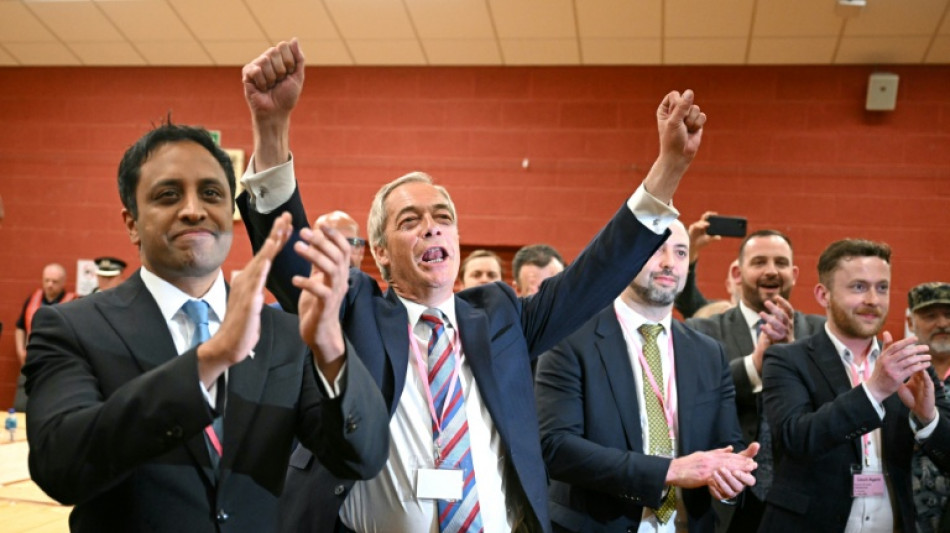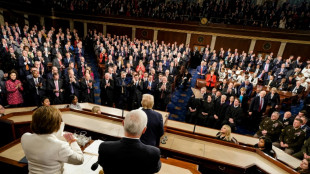
Hard-right romps across UK local elections slapping down main parties

Hard-right upstarts Reform UK snatched a parliamentary seat from Prime Minister Keir Starmer's Labour party Friday and seized control of several regional councils dealing a major blow to Britain's two establishment parties.
Reform, led by anti-immigrant firebrand Nigel Farage, won the parliamentary by-election in Runcorn and Helsby in northwest England by just six votes.
And reshaping the country's political landscape, it recorded a series of huge swings in other localities.
It won its first ever mayoral post in Lincolnshire and took control of its first regional and local councils, including central Staffordshire, northwestern Lancashire and Kent in the south.
"This is heartland Labour Party," Farage said after the knife-edge Runcorn by-election, which inflicted the first electoral loss on Starmer since the Labour leader took office last July.
"Their vote has collapsed, and much of it's come to us," said Farage.
"And that does away with the sort of media narrative that somehow it's just us versus the Conservatives. It's not. This is a whole different politics," added the Brexit champion.
The group's strong Runcorn showing -- overturning a huge Labour majority in one of the party's safest parliamentary seats -- adds impetus to Reform's momentum seen at last year's general election.
It appears to confirm a trend that the UK is entering an era of multi-party politics.
Retiree Christopher Davies, who voted Reform because he felt "disgruntled" with Labour, told AFP the result was a "wake up call for both" the country's main parties.
"I don't agree with all the things that Reform are on about, but... it was just out of total disillusionment with the system," the 67-year-old said.
The polls were the first since Starmer became prime minister and Kemi Badenoch took over the reins of the struggling opposition Conservatives last year.
The premier called the result "disappointing", pledging to go "further and faster" in delivering change.
Badenoch conceded the polls had been "very difficult" but said "renewal" of the Conservative Party had "only just begun".
- Political fragmentation -
Even though turnout was low across the board, analyst Tim Bale from Queen Mary University of London, said it was "an incredibly impressive performance" by Reform.
In the fight for six mayoralties, Reform won Greater Lincolnshire while Labour held three.
The Conservatives also regained the mayoral post in eastern Cambridgeshire and Peterborough from Labour.
Labour, however, only narrowly held the North Tyneside mayoralty after a 26-percent swing to Reform.
New Greater Lincolnshire mayor Andrea Jenkyns said the "fightback to save the heart and soul of our great country has now begun".
"Now that Reform is in a place of power, we can help start rebuilding Britain. Inch by inch," she said.
Reform's by-election victory takes its number of parliamentary seats to five, an unprecedented number for a British hard-right party in the 650-seat chamber.
Just 1,641 seats across 23 local authorities were up for grabs -- only a fraction of England's 17,000 councillors, with results indicating Reform had managed to transfer leads in national polls into tangible results at the ballot box.
"The first results show the Labour government is quite unpopular," analyst Anand Menon told AFP.
"The second point is the Conservatives clearly are not being seen as a credible government in waiting by the electorate. So it's bad news for both the big parties."
He warned Reform seems "to be more of a threat after these elections to Labour than any other party".
The centrist Liberal Democrats and left-wing Greens were also expected to make gains, particularly in the south, as surveys show Britons are increasingly disillusioned amid anaemic economic growth, high levels of irregular immigration and flagging public services.
Reform, which has vowed to "stop the boats" of irregular migrants crossing the English Channel, is hoping Thursday's successes will help it build its grassroots activism before the next general election -- likely in 2029.
'Change course' -
Labour won the national vote which propelled Labour to power in July with just 33.7 percent of the vote, the lowest share for any party winning a general election since World War II.
At a declaration in Runcorn shortly before 6:00 am (0500 GMT) election officials said that after a recount Reform's Sarah Pochin had won by just six votes -- with 12,645 votes to 12,639 for Labour candidate Karen Shore.
The result was a 17-percent swing from Labour to Reform after the party last year won the seat with 53 percent of the vote, while Reform got just 18 percent.
A Labour MP said the result showed Labour "must change course".
"The first 10 months haven't been good enough... if we don't improve people's living standards then the next government will be an extreme right wing one," lawmaker Brian Leishman wrote on X.
H.Leroy--PS

 London
London

 Manchester
Manchester
 Glasgow
Glasgow
 Dublin
Dublin
 Belfast
Belfast
 Washington
Washington
 Denver
Denver
 Atlanta
Atlanta
 Dallas
Dallas
 Houston Texas
Houston Texas
 New Orleans
New Orleans
 El Paso
El Paso
 Phoenix
Phoenix
 Los Angeles
Los Angeles



